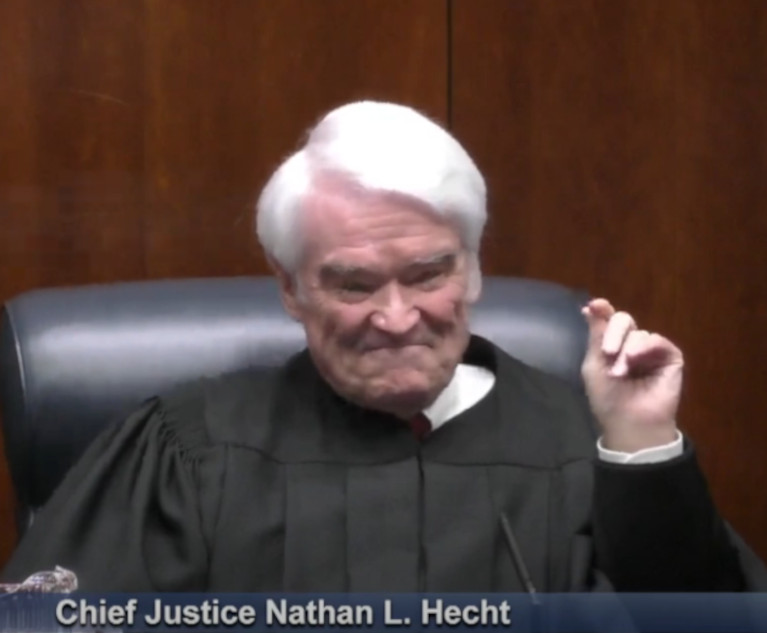Lawsuit Filed Monday Alleges Texas Mail-in Voting Rules Place Undue Burden on Right to Vote, Disenfranchises Texans
A lawsuit filed Monday by five Texas voters with medical conditions --- the NAACP-Texas, Voto Latino and the Texas Alliance for Retired Americans ---…
May 12, 2020 at 01:32 PM
6 minute read
 Brett Cain is a trial lawyer, the owner of the Cain Firm, and a Partner of The Law Center. (courtesy Photo)
Brett Cain is a trial lawyer, the owner of the Cain Firm, and a Partner of The Law Center. (courtesy Photo)
A lawsuit filed Monday by five Texas voters with medical conditions — the NAACP-Texas, Voto Latino and the Texas Alliance for Retired Americans — outlines four requirements they claim violate Texan voters' constitutional rights in the midst of a pandemic. While limits on who can vote by mail are currently being challenged in Texas courts, this particular case, filed in Federal Court in the Western District of the San Antonio division, argues the legal framework of the bill itself places an undue burden on the right to vote and risks disenfranchising thousands of Texans.
The first challenge brought in the lawsuit alleges that the current law which requires voters to pay postage to return mail-in ballots is a poll tax, which was proclaimed unconstitutional with the 24th Amendment, and was designed to dissuade Texans from participating in the voting process during times of economic hardship brought on by COVID-19. Second, plaintiffs argue deadlines for ballots to be forwarded and received are too narrow and should be extended. Currently, ballots must be postmarked by 7 p.m. Election Day and received by 5 p.m. the following day.
Third, Texas law also requires that the signature on the ballot match the signature on your vote by mail application. The lawsuit alleges this is discriminatory to those with disabilities, who may not be capable of signing identical signatures. Lastly, the lawsuit claims current restrictions on assisting voters in returning their absentee ballots are unconstitutional.
Texas Secretary of State Ruth Hughes, who was named as the defendant in the complaint for declaratory and injunctive relief, petitioned a federal judge to block the State of Texas from enforcing the current law. In the complaint, Plaintiffs argue, "Even if all registered voters are eligible to vote by mail in Texas in the November election, that would not be sufficient to prevent the serious risk of disenfranchisement and threats to public health that will occur if the Vote By Mail Restrictions remain in place in the pandemic." The complaint is specifically concerned with the approaching November elections and July primary runoffs, which the plaintiffs worry could already lack turnout due to COVID-19 concerns.
Previous legal battles have focused on who is eligible under state law to apply for an absentee ballot. Civil rights groups, including the National Redistricting Foundation, have fought to expand absentee ballot eligibility to include anyone who is not immune to the virus and does not want to risk infection by travelling to a polling location. This proposition was rebuffed in a brief by Texas Attorney General Ken Paxton, who warned against attempts to relax requirements.
Paxton proclaimed his warning in a press statement asserting, "Unlawful expansion of mail-in voting, which is a special protection made available to Texans with actual disabilities, will only serve to undermine the security of our elections and to facilitate fraud." Paxton maintains that the fear of contracting COVID-19 does not legally count as a sickness or disability. As election centers prepare for November, the lawsuit filed Monday focuses on challenging restrictions to voting by mail, and suggests changes to the current procedure; a debate that is not new. In fact, last year two Texans filed lawsuits after local officials nullified their votes when they mistakenly pronounced that the voters' ballot signatures did not match with the ones on record.
Similar to the mail-in vote lawsuit filed on Monday, the plaintiffs argued that the rejection of their ballots based on their signature was unconstitutional.
But the lawsuit filed Monday adds qualified voters who must follow strict guidelines during a pandemic due to medical conditions. George Morgan, one of the plaintiffs in the suit, has a genetic lung disorder that makes him particularly vulnerable to COVID-19, and has been in isolation since the emergency order took effect. He relies on food banks for meals and currently receives $19 dollars a week in Supplemental Nutrition Assistance Program (SNAP) benefits. According to the complaint, "Mr. Morgan cannot make a trip to the post office to buy stamps for fear of contracting COVID-19, and he does not currently have access to a reliable computer, so he would not be able to order postage online. Even if he was able to do so, he understands that he would have to purchase an entire book of stamps for $11," which he simply cannot afford. The complaint continues: "To avoid these issues in November, Mr. Morgan would like to ask a friend or acquaintance to pick up his marked, sealed mail-in ballot and deliver it to the county for him; however, he knows that the Voter Assistance Ban criminalizes this and he is unwilling to put others at risk of prosecution."
This look-alike poll tax puts an undeniably serious constraint on the right to vote. "At best, [the conditions] require Texans — millions of whom are vulnerable to severe complications from COVID-19 or have vulnerable loved ones — to pay to vote by mail so that they can avoid exposing themselves to the virus while exercising their right to vote," the plaintiffs alleged in the complaint. "At worst, it disenfranchises the millions of Texans who cannot risk exposure to COVID-19 but who also cannot obtain postage to mail their ballots."
While limits on who can vote by mail are already being challenged in Texas courts, plaintiffs hope this most recent lawsuit will help modernize mail-in voting for Texans. Americans have the right to life, liberty, and the pursuit of happiness, and anything that impedes participation in that process, including laws limiting constitutional voting rights, should be contested.
As it currently stands, COVID-19 could help accelerate the process of modernizing Texas voting by calling into question issues that have hindered Texas voters for years.
Brett Cain is a trial lawyer who has tried over 50 jury trials and has resolved hundreds more disputes by mediation since 2006. He is the owner of the Cain Firm, a partner of The Law Center, a national network of top law firms with decades of experience in advocating for those who have suffered from personal injury, asbestos-related diseases, motor vehicle accidents and more. Cain is proud to stand up for those who cannot stand for themselves, and as a result, has recovered millions of dollars for clients after insurance companies initially wouldn't pay.
This content has been archived. It is available through our partners, LexisNexis® and Bloomberg Law.
To view this content, please continue to their sites.
Not a Lexis Subscriber?
Subscribe Now
Not a Bloomberg Law Subscriber?
Subscribe Now
NOT FOR REPRINT
© 2025 ALM Global, LLC, All Rights Reserved. Request academic re-use from www.copyright.com. All other uses, submit a request to [email protected]. For more information visit Asset & Logo Licensing.
You Might Like
View All
ExxonMobil Sues California AG Bonta, Environmental Groups for Advanced Recycling 'Smear Campaign'

2 Judges: Meet the New Chief Justice and the GC Who Just Rose to the Bench
3 minute read

Trending Stories
- 1'A Death Sentence for TikTok'?: Litigators and Experts Weigh Impact of Potential Ban on Creators and Data Privacy
- 2Bribery Case Against Former Lt. Gov. Brian Benjamin Is Dropped
- 3‘Extremely Disturbing’: AI Firms Face Class Action by ‘Taskers’ Exposed to Traumatic Content
- 4State Appeals Court Revives BraunHagey Lawsuit Alleging $4.2M Unlawful Wire to China
- 5Invoking Trump, AG Bonta Reminds Lawyers of Duties to Noncitizens in Plea Dealing
Who Got The Work
J. Brugh Lower of Gibbons has entered an appearance for industrial equipment supplier Devco Corporation in a pending trademark infringement lawsuit. The suit, accusing the defendant of selling knock-off Graco products, was filed Dec. 18 in New Jersey District Court by Rivkin Radler on behalf of Graco Inc. and Graco Minnesota. The case, assigned to U.S. District Judge Zahid N. Quraishi, is 3:24-cv-11294, Graco Inc. et al v. Devco Corporation.
Who Got The Work
Rebecca Maller-Stein and Kent A. Yalowitz of Arnold & Porter Kaye Scholer have entered their appearances for Hanaco Venture Capital and its executives, Lior Prosor and David Frankel, in a pending securities lawsuit. The action, filed on Dec. 24 in New York Southern District Court by Zell, Aron & Co. on behalf of Goldeneye Advisors, accuses the defendants of negligently and fraudulently managing the plaintiff's $1 million investment. The case, assigned to U.S. District Judge Vernon S. Broderick, is 1:24-cv-09918, Goldeneye Advisors, LLC v. Hanaco Venture Capital, Ltd. et al.
Who Got The Work
Attorneys from A&O Shearman has stepped in as defense counsel for Toronto-Dominion Bank and other defendants in a pending securities class action. The suit, filed Dec. 11 in New York Southern District Court by Bleichmar Fonti & Auld, accuses the defendants of concealing the bank's 'pervasive' deficiencies in regards to its compliance with the Bank Secrecy Act and the quality of its anti-money laundering controls. The case, assigned to U.S. District Judge Arun Subramanian, is 1:24-cv-09445, Gonzalez v. The Toronto-Dominion Bank et al.
Who Got The Work
Crown Castle International, a Pennsylvania company providing shared communications infrastructure, has turned to Luke D. Wolf of Gordon Rees Scully Mansukhani to fend off a pending breach-of-contract lawsuit. The court action, filed Nov. 25 in Michigan Eastern District Court by Hooper Hathaway PC on behalf of The Town Residences LLC, accuses Crown Castle of failing to transfer approximately $30,000 in utility payments from T-Mobile in breach of a roof-top lease and assignment agreement. The case, assigned to U.S. District Judge Susan K. Declercq, is 2:24-cv-13131, The Town Residences LLC v. T-Mobile US, Inc. et al.
Who Got The Work
Wilfred P. Coronato and Daniel M. Schwartz of McCarter & English have stepped in as defense counsel to Electrolux Home Products Inc. in a pending product liability lawsuit. The court action, filed Nov. 26 in New York Eastern District Court by Poulos Lopiccolo PC and Nagel Rice LLP on behalf of David Stern, alleges that the defendant's refrigerators’ drawers and shelving repeatedly break and fall apart within months after purchase. The case, assigned to U.S. District Judge Joan M. Azrack, is 2:24-cv-08204, Stern v. Electrolux Home Products, Inc.
Featured Firms
Law Offices of Gary Martin Hays & Associates, P.C.
(470) 294-1674
Law Offices of Mark E. Salomone
(857) 444-6468
Smith & Hassler
(713) 739-1250






